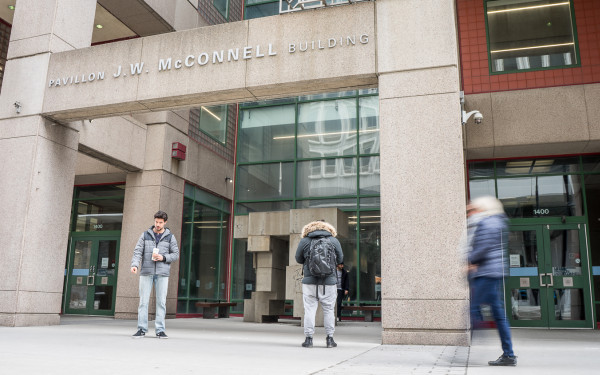Mapping Concordia’s Services
On the Ambitious Project to Examine How the University Fails and Meets Its Students’ Needs
The classroom is a concept not often questioned.
A teacher stands in front of a crowd of seated children, adolescents, or adults in an enclosed space. The teacher talks. The students are supposed to listen. Some don’t. Some might ask questions, or may just sit quietly. Sometimes, students don’t show up to class at all.
This traditional classroom setting has been a constant in most people’s lives since they were four or five, but that doesn’t mean it’s the best and only way to learn.
“There are a million reasons why the classroom might not be the most constructive for different cognitive styles,” said Jess Glavina, a coordinator from the Centre for Gender Advocacy at Concordia.
Glavina, a former Concordia geography student, said this in reference to an American author, Margaret Price, who wrote the 2010 book Mad at School: Rhetorics of Mental Disability and Academic Life.
Glavina alluded to this text while explaining their project to figure out the state of Concordia’s learning environment and the services currently available to students. They call it “The Mapping Project.”
The university-wide, yearlong analysis will examine issues related to gender, sexuality and neurodiversity, Glavina explained. The project is under the umbrella of the Centre for Gender Advocacy, a fee-levy group that promotes gender equality and empowerment.
The centre, located next to the Hall building on Concordia’s downtown campus, offers peer-to-peer support. Although not a peer supporter themselves, Glavina said they observed recurring themes from students who have dropped in.
These can be erasure, invisibility or general frustration that their learning styles aren’t being considered.
This is where neurodiversity comes in. Neurodiversity, according to Cara Liebowitz from the online magazine Everyday Feminism, means that all brains and minds are unique, and there’s no “right” or “wrong” type of neurocognition. This term appealed to Glavina for The Mapping
Project because it captured concerns surrounding mental health and learning disabilities; the term is rooted in the disabled activist community. Coined in the 1990s by autism activists, Liebowitz further explained, neurodiversity encompasses psychiatric disabilities like anxiety or schizophrenia as well as developmental and intellectual disabilities like autism or Down syndrome.
By traditional medical standards, these diagnoses are rarely thought of as “normal” and can be seen as something to be cured, Glavina said. The Mapping Project aims to deconstruct these stigmas and see how effectively the university helps neurodivergent students.
To understand this, Glavina is examining faculty practices and curricula as well as the accessibility and variety of services available on campus. They’re investigating through surveys, interviews and even a postcard campaign with the theme of unicorns.
They have been distributing postcards to collect written testimonials and anecdotes about experiences at Concordia, inside and outside the classroom. One postcard reads, “Like unicorns, students ‘outside the norm’ are often treated as imaginary or rare. But we are here. And you are in unicorn habitat.”
There’s also a plan next semester to have faculty members voluntarily submit their curricula to The Mapping Project, to then be analyzed for gender and sexuality inclusivity by a group of students. Glavina also plans to survey faculty about teaching practices.
While professors can be very passionate and sensitive towards their students, there’s no formalized training to address students with different needs, they explained.
Glavina plans to seek more student feedback too, by adding questions to a survey that the Concordia Student Union will conduct next semester.
“We want a map where things need to be strongly improved and where things are super good,” said Gabrielle Bouchard, the peer support and trans advocacy coordinator of the Centre for Gender Advocacy. “It is important because the university wants to move forward—we’re still centuries behind where we should be.”
Glavina has been scheduling meetings with high-ups from a variety of Concordia services and organizations since the summer. One person they already met is the director of Concordia’s new Campus Wellness and Support Services Centre, Gaya Arasaratnam.
Arasaratnam oversees the three previously separate services of the Access Centre for Students with Disabilities, Health Services, and Counseling and Psychological Services. Her job is to streamline these three offices and see how they can improve their practices.
She wants to create a common health record, where staff from across these departments can have access to the same documentation for every student. The timeline of completion is approximately four to five years because the transition from paper to digital is lagging. She said, though, that benefits could come as early as 2018.
In the last academic year of 2015-16, Arasaratnam said 1,818 students sought the help of the Access Centre for Students with Disabilities, while 2,438 students used Counselling and Psychological Services.
Currently, conversations are happening about how to improve these services in addition to seeing how staff themselves can be better cared for with such high demand, Arasaratnam explained.
Concordia President Alan Shepard said in an interview on Friday that the budget for these services, especially for mental health, has been flat for a long time. “I would love to see us put additional funds into different mental health issues,” he said.
Arasaratnam said she’s also working with the Centre for Gender Advocacy to understand how the university can better serve its trans students. Based on their conversations with various supervisors, Glavina said that it appears no one from the university is resting on their laurels.
The results discovered through The Mapping Project will be released by next summer.

web_748_1050_90.jpg)



_600_375_90_s_c1.jpg)
_600_375_90_s_c1.jpg)
_600_375_90_s_c1.jpg)